Before wishing someone “goodbye,” it might help to know how to spell it. This article will explore whether it’s one or two words. There is also a hyphenated form that we need to discuss!
Good bye vs. Good-bye vs. Goodbye
“Goodbye” is the most common phrase because it’s correct as both a noun and adjective. We might also find the hyphenated form of “good-bye” is used in some cases, but only when a noun comes directly after it. “Good bye” is never written as two words.

According to Google Ngram Viewer, “goodbye” is by far the most popular choice of the three. These results show that it’s much more likely for someone to use the one-word option. However, the hyphenated form is sometimes correct.

In The Cambridge Dictionary and The Oxford Dictionary, “goodbye” is the only defined form of the three. In both dictionaries, we can use this one-word variation as a noun or adjective to show that we are saying goodbye to someone.
You might benefit from checking these examples out to see the difference between the noun and adjective forms:
- Noun: It’s not going to be goodbye until I say so.
- Adjective: The good-bye note was left on the table.
Is “Goodbye” One Word?
“Goodbye” is most commonly written as one word. We can use it as both a noun and an adjective in this form. As a noun, it is used to say goodbye to someone. As an adjective, we can use the combined words to show that another noun is modified.
These examples should help you make more sense of it:
- I didn’t want to have to say goodbye to you like this, but I suppose it will do.
- Let’s not let this be our last goodbye! There’s still plenty of time for us to spend together.
- It’s not goodbye until one of us dies! That’s all I have to say to you right now.
- I don’t think he said goodbye! Oh well! Maybe he didn’t care about me as much as I thought he did.
Is “Good bye” Two Words?
“Good bye” is never correct as two words. It’s such a common phrase that many people have chosen to group it together as one word, and that’s the form that’s stuck as the language evolved. “Good bye” may once have been the best choice, but it has since died out.
Perhaps these examples will help you understand it:
- Correct: I want to say goodbye to you, but I’m worried about whether that’s going to be too final!
- Incorrect: You shouldn’t ever have to say good bye! You know I’ll be back in your life sooner or later.
- Correct: This isn’t goodbye! I’ll see you again on the other side; just you wait!
- Incorrect: I won’t say good bye! I can’t bring myself to do it; it’s too much to bear!
Is “Good-bye” Hyphenated?
“Good-bye” can be hyphenated in specific circumstances. If it is used as an adjective before a noun, we can hyphenate the two words to show how the modification takes place. However, there is no requirement to do this, and “goodbye” also works.
AP Stylebook rules teach us that multiple words should be hyphenated whenever they are used to modify a noun. If “good” and “bye” come before a noun, then it makes sense to hyphenate them when we are following AP Style.
Check these examples out to give you a hand with it:
- I would love to give you a good-bye kiss right now! Would you allow me the courtesy?
- This isn’t the good-bye message I wanted to receive, but I suppose it could be a lot worse.
- It’s not a good-bye speech without a few tears being shed as we go!
- Don’t worry; this isn’t the good-bye stage of the relationship! There’s plenty more to come our way first!
Is “Bye” Capitalized In The Word “Good-Bye”?
Some people tend to get confused when it comes to capitalizing hyphen forms. That’s why we thought it would be good to include this bit.
“Good-bye” is not a proper noun, so you do not have to worry about capitalizing it. Only “good” is capitalized if it starts a sentence, but “bye” is not.
The only time you would capitalize both words is when it’s included in your title style. If every word is capitalized, then it would also make sense to capitalize both parts of the hyphen form.
